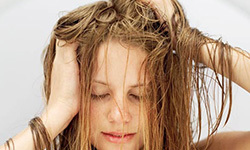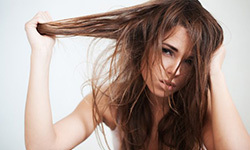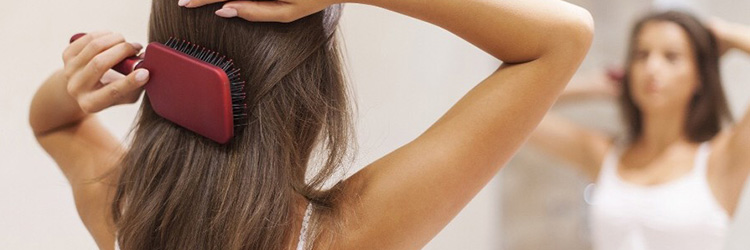Greasy hair is the opposite of a good hair day. It can put a damper on your entire appearance, and feels extremely uncomfortable all day long. To make matters worse, if not treated immediately, it can lead to itching and irritation. Now, you might think that washing your hair right away may be the absolute solution. However, that’s just a temporary treatment. If you’ve been prone to greasy hair for a long time now, you might want to first understand what causes greasy hair suddenly. So, let’s address the science behind, before we move on to effectivegreasy hair remedies.
Greasy hair: The science behind

The same principle is applicable to your hair. The glands that produce sebum are also located next to your hair roots in the dermis of your scalp. The glands channel the sebum to your hair follicle, thus, causing your scalp to produce excess oil and grease. The causes behind excessive sebum production can be plenty, such as:
- Hormonal changes
- Heredity
- Poor diet
- Seasonal changes
- Improper hair care habits
- Side-effects of certain medication
How greasy hair affects different hair types

Thin, straight hair, on the other hand, looks greasy all over because of the fine texture. The oil is comparatively easier to get distributed, which is why, those with fine hair feel the grease from the hair roots till the ends.
How to treat greasy hair

-
- Space out your washes:
Greasy hair is a cyclical issue, which is why, too much or too little washing can irritate your scalp. Stick to washing your hair every 2-3 days to get oil production under control.
- Use a clarifying shampoo twice a month:
Skip using heavy conditioners every once in a while, as they could contribute to excess oil build up. Stick to a clarifying shampoo that will help get rid of traces of oil that a usual shampoo might not be able to.
- Increase your intake of Vitamin B:
The lack of Vitamin B in your body is directly associated with high level of sebum that your scalp produces. To treat the grease, include foods like eggs, milk, cheese, meat, and fish to regulate your Vitamin B levels.
- Rinse off with 2-3 tsp of apple cider vinegar:
Mix it in a mug of water, and use the concoction for a final rinse. The vinegar conditions your hair, and hydrates your roots, while washing off any excess oil on your hair strands.
- Use an egg mask twice a week:
Did you know; egg yolk works wonders on removing excess grease in the hair? Simply mix two eggs with a tsp of lemon juice, and apply on wet hair. Leave it on for 7-10 minutes and wash off with a mild shampoo.
Apart from the aforementioned treatment options for greasy hair, keep your body hydrated at all times, and purchase a good quality dry shampoo to curb excess grease on the hair. Greasy hair can be a nuisance to deal with, but all it takes is the right products and some lifestyle alterations to control the sebum production.














